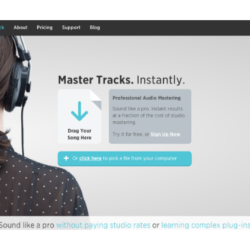Resident studio wizard Pezzner explains the mastering process and gives online audio mastering software Landr a try.
Audio mastering is the final step in the post-production process. It’s the stage between the final mixdown and the distribution of your music. Once mastered, your songs are then “release ready” and will stand up comparably in quality and loudness to commercially released music. To put it in perspective: it’s the difference between a finished painting by itself or a painting that has been varnished, framed, hung on a wall and lit up.
Of the many steps that each artist will go through to produce a recording, the mastering phase is arguably the make it or break it stage. Aside from sheer talent, every composer and producer will compose a song to the best of their ability using software or tape, a network of effects processors, equalizers and technical know-how to produce a recording that is artistically sound. But it doesn’t stop there. Just because a recording is artistically up to par, doesn’t mean the overall recording is sonically up to par, and this is the point where they will need to hand over the final recording to a mastering engineer to provide the sheen that is needed meet the bar they’ve set for sound quality in the music industry.
What Exactly Are We Talking About?
So, exactly what does a mastering engineer do? The mastering studio is responsible for raising the overall level of your song, evening out the EQ of the individual tracks to create a cohesive playlist, enhancing the stereo field, eliminating unwanted noises, making your song sound its best on any sound system (even laptop speakers), and adding the meta data and ISRC codes needed by the music industry for retail sale.
A “dark art” of sorts, each mastering engineer will handle this task a little differently, and while every mastering engineer will agree that the core of their art relies on their trained ear, each engineer has their own process, or chain of effects to get this job done. Some engineers base their work completely on mathematics and high-end digital audio processing software, while others take a more puritan approach using only the “best” analog hardware they can amass, some use a bit of both strategies. Both schools of engineers will master music on the best speakers that their money will afford them, in a sound studio that has been treated to the best of their abilities, and both will agree that at the end of the day, it is their trained ears that will allow them provide the sonic flavor your music needs.
As the age of the bedroom producer has fallen upon us, so has the age of the bedroom mastering engineer. Just as it became simple enough for any aspiring producer to produce studio quality dance tracks using software on their laptop, so has it become an effortless task to master your songs without the need of a professional mastering studio. We are entering an age where any producer can upload an unmastered recording exported out of their Logic Audio to an online service that will master your song digitally without the use of a mastering engineer for free (for an 192k mp3) or very little cost (as low as $10 for 4 WAV files). But how does this hold up to the tried and true professional mastering engineer?
The Product
Today we are going to look at one company called MixGenius and their award winning LANDR tool, which offers a drag and drop audio mastering solution, and compare their service to the age old art of hands on audio mastering.
LANDR’s system is built on MixGenius’ custom algorithms based on almost a decade of research and as the company boasts, their system gets “smarter and smarter. Its true beauty lies on its ability to learn.” It does this with an adaptive engine that “listens” and reacts to music, making micro adjustments to the audio frame by frame using standard mastering tools like multi-band compression, EQ, stereo enhancement, limiting and aural excitation. It does all of this based on the sonic properties of the original recording. Simply sign up for a basic account, drag your uncompressed audio file into their web app and the system will instantly process your song and send a 192kbps mp3 of the final master to your email. If you are looking to tweak its settings you have essentially three options: Low, Medium and High. If you need a WAV file, Landr will allow for 4 uncompressed masters per month for $9, or just sign up for their $19/month pro unlimited account for unlimited WAV masters.
But How Does It Sound?
Below we have five different audio clips of my track “Birdsong” from my Last Night in Utopia LP, released on Systematic Records last year. The first audio file is the uncompressed master, another version mastered by a digital engineer with over 25 years experience. The last three clips are versions mastered by Landr in each of the three stages that Mixgenius offers.
In my experience playing with Landr, I’ve found the software to turn out impressive results, but it’s really easy to overdo it. A track with plenty of headroom can still come out sounding too “sizzly” in the high end, and muddy in the bass even on the lowest mastering setting. If you are going to use Landr to master your tracks, you may find yourself in a frustrating cycle of re-EQing, re-mixing and re-uploading to Landr till you find a balance that will render nicely. Any producer looking for an easy way to brighten up their tracks to send as demos to record labels might find this a very useful tool. (Note: The last demo I submitted to a label was quickly mastered using Landr, and the label signed the EP.) But at the end of the day, I don’t think there is any software that can replace a skilled mastering engineer.







Join the discussion
comments powered by Disqus